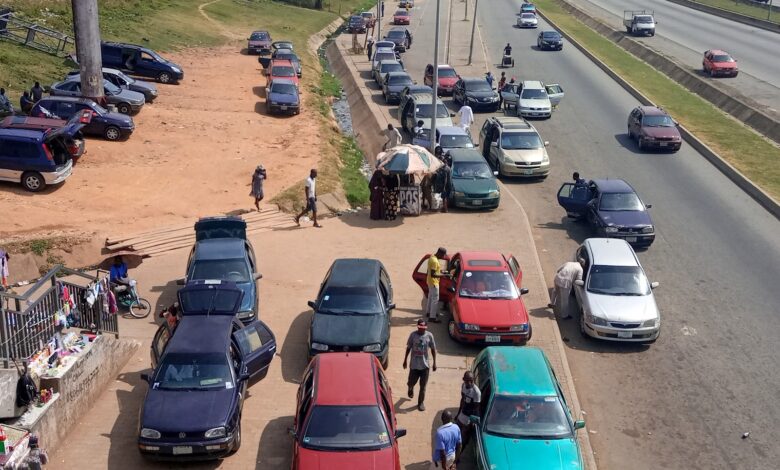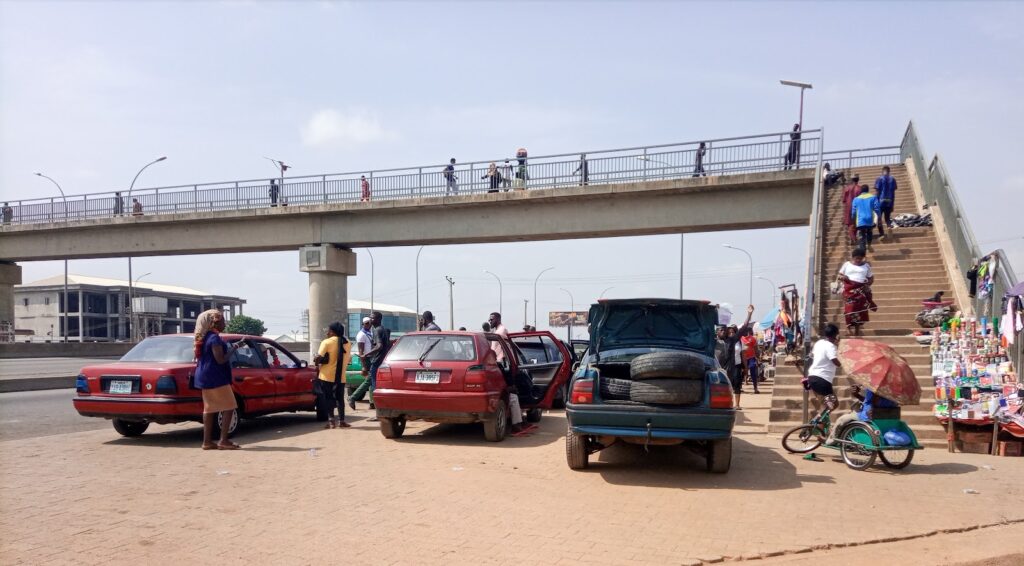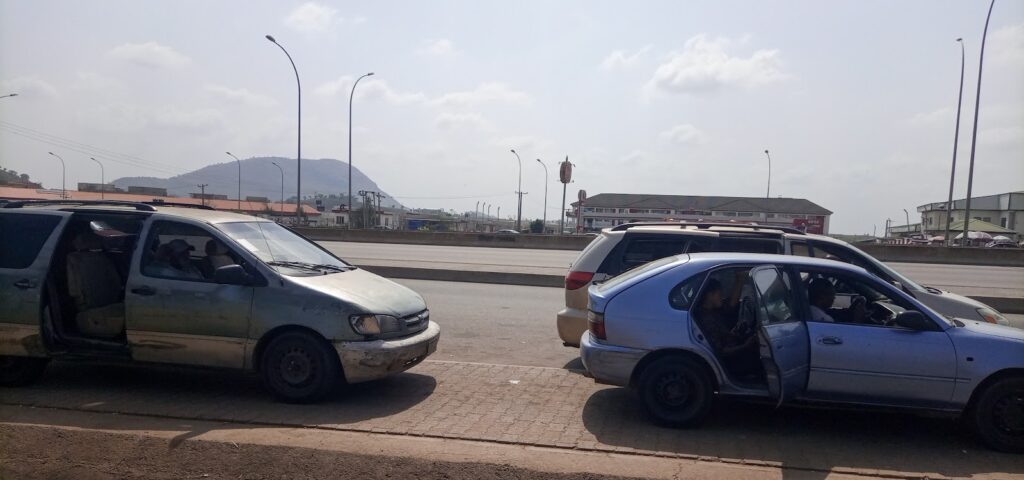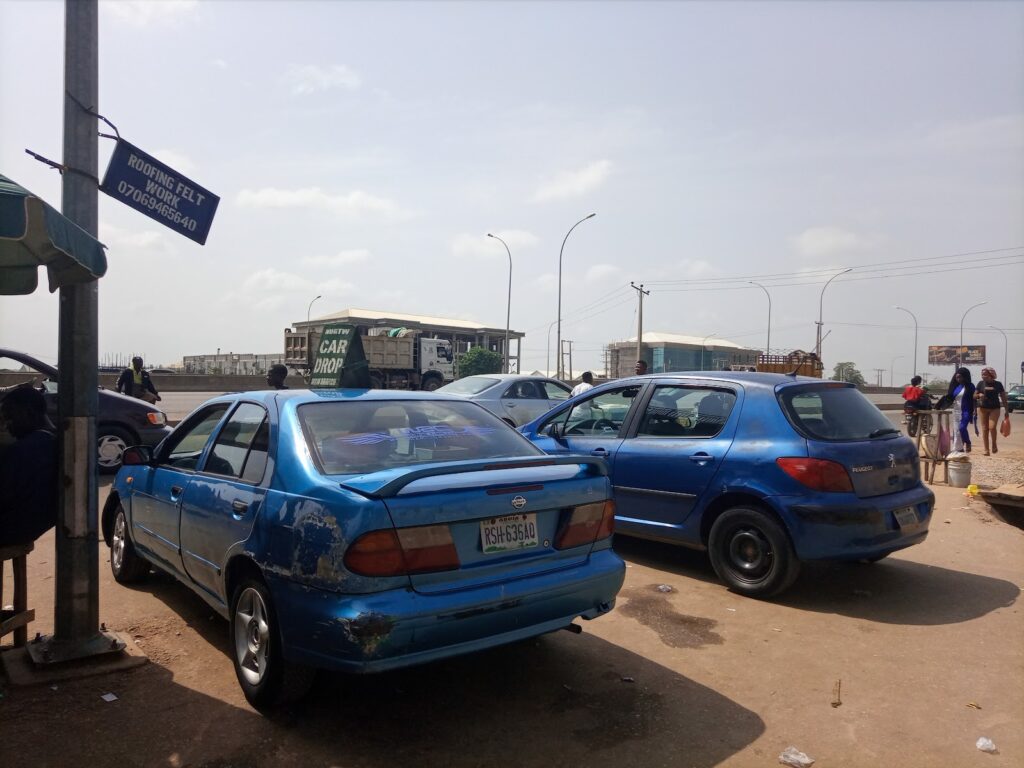‘One Chance’: Nigeria’s Capital City Residents Narrate Commercial Vehicle Robbery Encounters
The general belief of many Nigerians is that commercial vehicle robbery locally known as ‘one-chance robbery’ become more virulent at year-end to keep up with financial needs during the festive periods. The desperation to make quick cash has pushed several persons to commit crimes such as armed robbery and kidnapping for ransom.

On Sept. 16, Precious Ihama hopped into the back passenger seat of a commercial vehicle around 6 p.m. at the Nicon Junction in Abuja, North-Central Nigeria. The vehicle zoomed off, and after a while, some passengers stopped at their various destinations one after the other.
Now alone in the back seat, one supposed passenger at the front jumped right beside Precious, wielding a knife to scare her. “I screamed as he hit me,” she narrated to HumAngle. “Then, I began to cooperate with them.”
Precious said she was shocked, but what happened was not new to her. Commercial vehicle robbery — locally known as one-chance — is a menace in Abuja and other parts of Nigerian cities. The robbers sometimes operate in cahoots with commercial drivers to fleece passengers, using force. Although the scourge has lingered for decades, it resurges towards the end of every year, amid ravaging insecurity in the country.
The general belief of many Nigerians is that one-chance robbers become more virulent at year-end to keep up with their financial needs during the festive periods. The desperation to make quick cash has pushed several persons to commit crimes such as armed robbery and kidnapping for ransom. They become syndicates setting traps for passengers with their vehicles.
Speaking to HumAngle, Precious recalled how the armed men rolled up the car windows, increased the volume of the radio and sped off. She screamed aloud but no one plying the route could hear her voice.
“One of them tore my shirt and started sexually molesting me,” she said. “While doing so, he told me that he was a kidnapper.”
Fear enveloped Precious so much that she thought she was living her last moments. She cried and begged them to let her go, but her pleas went on deaf ears.

“I caught a glimpse of hope when they seized my phones, went through my bank accounts, and called some of my contacts asking for a ransom of N3 million. That would at least alert my loved ones that I was in danger,” she said.
After three hours of continuous pleadings and beatings, she was released in the middle of nowhere. The assailants stopped her by an expressway and asked her to act like nothing happened.
Scarred and struggling to heal, Precious believes other drivers and the parking attendants may have affiliations with the syndicates. She said the incident caused her some psychological trauma and has taken a toll on her finances, forcing her to take costly ride-hailing vehicles for her routine movements. She vows there may never be a time she would board public cars anymore.
Falling victim to this menace isn’t always about being careless; the perpetrators have mastered the game of the crime, she said. Precious is not the only victim of the resurgence of commercial vehicle menace in Nigeria’s capital city.
Odejide Samson, a resident in Abuja had just received his N40, 000 salary. With an additional N25,000 in his account, he went to Wuse Market in Abuja to get a new phone.
When he arrived at the Federal Housing Junction around 9 a.m., one commercial driver beckoned, saying there was only one space left to fill the car.
“Come in,” the driver let him in and zoomed off.

About two minutes into the journey, the man seated close to the left window started a conversation with the driver, asking if his bag in the boot was safe. He went further to say the bag contained some expensive things he had stolen from his boss. He offered to share the money with the passengers in the vehicle. Samson kept mute and suspicious of everyone in the vehicle.
“When they realized that I wasn’t giving audience to the conversation, the driver began to drive very roughly,” he recalled.
Samson wound down the vehicle’s window to take note of the route. The moment they got to a bustling location he shouted for help, saying: “I want to get down, open the door.” The driver roughly and unwillingly parked his car and opened the door for him.
Samson thought he had escaped the robbery. He boarded another vehicle to his destination. When he got to the market, his pockets were empty. Someone had stolen his wallet containing the N65,000 he wanted to use to get a new phone, he said.
There appears to be a resurgence of one-chance cases in the suburbs of Nigeria’s capital city. Samson and Precious are just two of many victims.
In June, one Nnaemeka Prince was thrown out of the vehicle after his phones and laptop were forcefully taken from him around the Apo area of Abuja. After collecting his smartphones and attempting to withdraw funds from his bank accounts, Richard Atoo, another victim of the menace, said he was stabbed by the robbers, leaving him with 30 knife wounds that nearly ended his life. When Ayuba Raji noticed his driver was swerving towards another route, he questioned him, but someone in the car pulled out a gun and threatened to shoot him. His attackers parked their vehicle under a bridge near the Abuja National Stadium, forcing him and his friend to lie on the ground while they robbed them.

Josephine Adeh, the Public Relations Officer of the FCT Police, did not respond to HumAngle’s calls and texts inquiring about what the police are doing to curb the menace. However, SP Anjuguri,a public relations officer at the Police Force told a HumAngle audience during a recent virtual discussion that ‘One Chance’ is a transportation problem, and for it to be curbed, there needs to be an effective transport system.
He further emphasised that commuters need to take certain measures, such as boarding commercial vehicles only from recognised parks, entering marked cars only, avoiding solo movements, and properly documenting the details of their rides with family members before boarding.
Support Our Journalism
There are millions of ordinary people affected by conflict in Africa whose stories are missing in the mainstream media. HumAngle is determined to tell those challenging and under-reported stories, hoping that the people impacted by these conflicts will find the safety and security they deserve.
To ensure that we continue to provide public service coverage, we have a small favour to ask you. We want you to be part of our journalistic endeavour by contributing a token to us.
Your donation will further promote a robust, free, and independent media.
Donate HereStay Closer To The Stories That Matter




